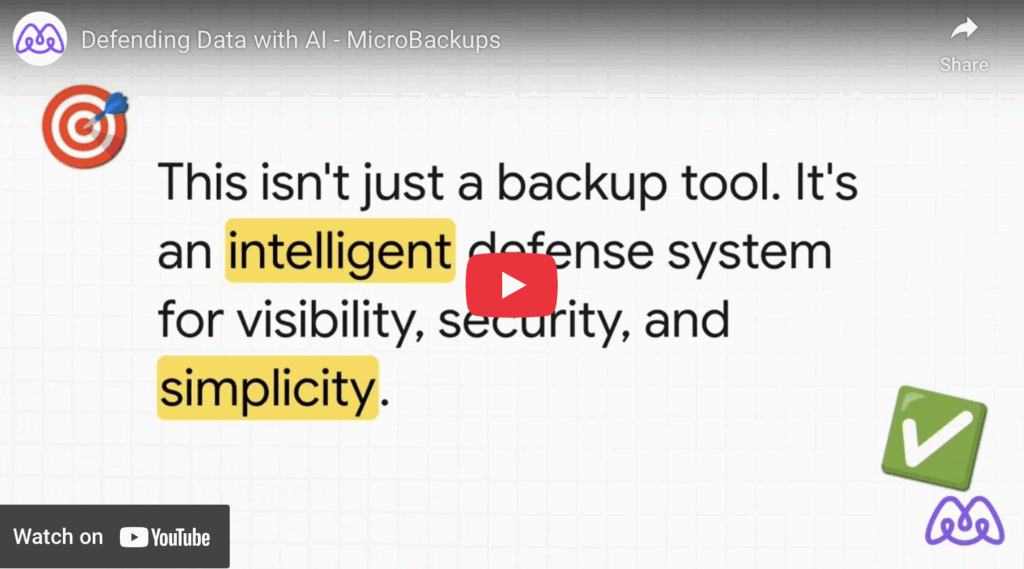The assessment focuses on key functionalities, with an emphasis on the distinct differences that may influence selection for organizations similar to ours—those managing 50 to 200 users amid substantial SaaS integration and regulatory demands.
Core Functionalities: Scope and Focus
Both MicroBackups and Acronis Cyber Protect provide robust cloud-oriented backup capabilities designed to mitigate risks from ransomware, system failures, and human error. However, MicroBackups prioritizes AI-driven intelligence tailored to cloud-centric environments, whereas Acronis Cyber Protect adopts a more comprehensive approach, integrating backup with extensive cybersecurity features across diverse workloads. This divergence is evident in their design philosophies: MicroBackups streamlines operations for dynamic cloud ecosystems, while Acronis excels in hybrid and on-premises scenarios requiring unified threat management.
Artificial Intelligence and Predictive Capabilities
A primary differentiator lies in the application of artificial intelligence. MicroBackups employs advanced AI to proactively identify vulnerabilities, such as orphaned files and inactive user accounts, while forecasting potential disruptions through analysis of SaaS outage patterns, virtual machine logs, and even external factors like weather events. This predictive layer enabled our team to preemptively reallocate resources during a recent cloud service interruption. In contrast, Acronis leverages machine learning for anomaly detection and automated scripting (via Cyber Scripting), focusing on behavioral threat identification to minimize downtime during active incidents. Thus, MicroBackups offers superior foresight for cloud-specific risks, whereas Acronis provides stronger real-time endpoint protection and automation for broader threat landscapes.
Threat Mitigation and Recovery Processes
In addressing ransomware—a persistent concern for our sector—both solutions demonstrate efficacy, yet their mechanisms differ markedly. MicroBackups’ AI detects subtle data alterations in real time, initiating elevated-frequency backups and tagging recovery points for swift retrieval, reducing restoration times to mere minutes through intuitive interfaces. Acronis, however, integrates endpoint detection and response (EDR) with immutable storage and malware scanning during restores, achieving sub-hour recovery in controlled tests but requiring more technical oversight. The key distinction: MicroBackups emphasizes seamless, user-accessible recovery for cloud data, while Acronis fortifies defenses against endpoint-centric attacks with forensic-grade tools.
Regulatory Compliance and Governance
Compliance with frameworks such as GDPR, HIPAA, and PCI DSS is non-negotiable in our operations. MicroBackups automates gap identification and data lineage tracking to support requests under CCPA, complemented by pre-prepared Data Processing Agreements (DPAs) and Business Associate Agreements (BAAs). Acronis counters with e-discovery for Microsoft 365, regulatory data mapping for NIS2, and evidentiary archiving capabilities. While both facilitate audit readiness, MicroBackups differentiates through its emphasis on automated cloud governance, whereas Acronis provides deeper integration for email and legal discovery needs.
User Interface and Implementation
Ease of deployment and usability represent another area of contrast. MicroBackups features a multi-channel natural language interface, enabling non-technical stakeholders to initiate restores via email, Slack, or voice commands—our implementation required less than a full day. Acronis offers a centralized dashboard with remote management and automated inventory, though it demands greater administrative expertise, as noted during our evaluation. Consequently, MicroBackups promotes broader organizational accessibility, in opposition to Acronis’ more specialized, IT-focused controls.
Cost Structure and Scalability
Pricing models further underscore their differences. Acronis Cyber Protect commences at approximately $103 per device annually for its Standard edition, escalating with advanced features like tape integration, which suits large-scale, multi-workload deployments. MicroBackups adopts a flexible, size-agnostic pricing approach—details available upon sales inquiry—yielding us a 20% cost reduction without per-device constraints. MicroBackups thus appeals to cost-conscious cloud adopters, while Acronis accommodates expansive, heterogeneous infrastructures.
In summary, Acronis Cyber Protect remains a formidable choice for organizations seeking integrated cybersecurity across endpoints and hybrids, backed by its proven resilience. MicroBackups, conversely, distinguishes itself through predictive AI, streamlined cloud recovery, and inclusive usability, aligning closely with our needs and yielding measurable efficiency gains. Our transition has proven instrumental in enhancing operational resilience.
I invite your insights: What experiences have you encountered with these or comparable solutions? I welcome a dialogue on optimizing data protection strategies.



